225 books about Comparative Literature and 14
start with D
225 books about Comparative Literature and 14
225 books about Comparative Literature
14 start with D start with D
14 start with D start with D
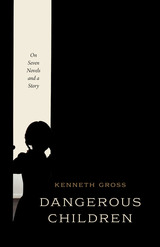
Dangerous Children
On Seven Novels and a Story
Kenneth Gross
University of Chicago Press, 2022
Gross explores our complex fascination with uncanny children in works of fiction.
Ranging from Victorian to modern works—Lewis Carroll’s Alice in Wonderland, Carlo Collodi’s Pinocchio, Henry James’s What Maisie Knew, J. M. Barrie’s Peter and Wendy, Franz Kafka’s “The Cares of a Family Man,” Richard Hughes’s A High Wind in Jamaica, Elizabeth Bowen’s The Death of the Heart, and Vladimir Nabokov’s Lolita—Kenneth Gross’s book delves into stories that center around the figure of a strange and dangerous child.
Whether written for adults or child readers, or both at once, these stories all show us odd, even frightening visions of innocence. We see these children’s uncanny powers of speech, knowledge, and play, as well as their nonsense and violence. And, in the tales, these child-lives keep changing shape. These are children who are often endangered as much as dangerous, haunted as well as haunting. They speak for lost and unknown childhoods. In looking at these narratives, Gross traces the reader’s thrill of companionship with these unpredictable, often solitary creatures—children curious about the adult world, who while not accommodating its rules, fall into ever more troubling conversations with adult fears and desires. This book asks how such imaginary children, objects of wonder, challenge our ways of seeing the world, our measures of innocence and experience, and our understanding of time and memory.
Ranging from Victorian to modern works—Lewis Carroll’s Alice in Wonderland, Carlo Collodi’s Pinocchio, Henry James’s What Maisie Knew, J. M. Barrie’s Peter and Wendy, Franz Kafka’s “The Cares of a Family Man,” Richard Hughes’s A High Wind in Jamaica, Elizabeth Bowen’s The Death of the Heart, and Vladimir Nabokov’s Lolita—Kenneth Gross’s book delves into stories that center around the figure of a strange and dangerous child.
Whether written for adults or child readers, or both at once, these stories all show us odd, even frightening visions of innocence. We see these children’s uncanny powers of speech, knowledge, and play, as well as their nonsense and violence. And, in the tales, these child-lives keep changing shape. These are children who are often endangered as much as dangerous, haunted as well as haunting. They speak for lost and unknown childhoods. In looking at these narratives, Gross traces the reader’s thrill of companionship with these unpredictable, often solitary creatures—children curious about the adult world, who while not accommodating its rules, fall into ever more troubling conversations with adult fears and desires. This book asks how such imaginary children, objects of wonder, challenge our ways of seeing the world, our measures of innocence and experience, and our understanding of time and memory.
[more]
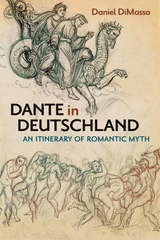
Dante in Deutschland
An Itinerary of Romantic Myth
Daniel DiMassa
Bucknell University Press, 2022
Around the turn of the nineteenth century, no task seemed more urgent to German Romantics than the creation of a new mythology. It would unite modern poets and grant them common ground, and bring philosophers and the Volk closer together. But what would a new mythology look like? Only one model sufficed, according to Friedrich Schlegel: Dante’s Divine Comedy. Through reading and juxtaposing canonical and obscure texts, Dante in Deutschland shows how Dante’s work shaped the development of German Romanticism; it argues, all the while, that the weight of Dante’s influence induced a Romantic preoccupation with authority: Who was authorized to create a mythology? This question—traced across texts by Schelling, Novalis, and Goethe—begets a Neo-Romantic fixation with Dantean authority in the mythic ventures of Gerhart Hauptmann, Rudolf Borchardt, and Stefan George. Only in Thomas Mann’s novels, DiMassa asserts, is the Romantics’ Dantean project ultimately demythologized.
[more]
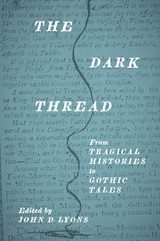
The Dark Thread
From Tragical Histories to Gothic Tales
John D. Lyons
University of Delaware Press, 2011
In The Dark Thread, scholars examine a set of important and perennial narrative motifs centered on violence within the family as they have appeared in French, English, Spanish, and American literatures. Over fourteen essays, contributors highlight the connections between works from early modernity and subsequent texts from the eighteenth through the twentieth centuries, in which incidents such as murder, cannibalism, poisoning, the burial of the living, the failed burial of the dead, and subsequent apparitions of ghosts that haunt the household unite “high” and “low” cultural traditions. This book questions the traditional separation between the highly honored genre of tragedy and the less respected and generally less well-known genres of histoires tragiques, gothic tales and novels, and horror stories.
Published by University of Delaware Press. Distributed worldwide by Rutgers University Press.
Published by University of Delaware Press. Distributed worldwide by Rutgers University Press.
[more]
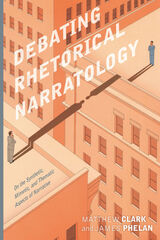
Debating Rhetorical Narratology
On the Synthetic, Mimetic, and Thematic Aspects of Narrative
Matthew Clark and James Phelan
The Ohio State University Press, 2020
In Debating Rhetorical Narratology: On the Synthetic, Mimetic, and Thematic Aspects of Narrative, Matthew Clark and James Phelan provide a model of lively, sharp, and good-natured scholarly exchange. Clark proposes “friendly amendments” to Phelan’s theorizing of the synthetic, mimetic, and thematic aspects of narrative, and Phelan responds, often by explaining why he finds Clark’s amendments less-than-friendly. Clark rounds off the debate by offering a brief rejoinder. Clark and Phelan consistently ground their theoretical arguments in their analyses of particular narratives, drawing on a corpus that ranges from Homer’s Iliad to Tobias Wolff’s In Pharaoh’s Army and includes, among many others, Jane Austen’s Emma, George Orwell’s 1984, and Toni Morrison’s Beloved.
Clark and Phelan’s deep dive into the synthetic, mimetic, and thematic leads them to explore many other aspects of narrative and narrative theory: style, audiences, the mimetic illusion, fictionality, and more. Their investigation also leads them into questions about rhetorical narratology’s relation to other projects in narrative theory, especially unnatural narratology, and, indeed, about how to assess the explanatory power of competing theories. Ultimately, their debate is compelling testimony about the power of both narrative theory and narrative itself.
Clark and Phelan’s deep dive into the synthetic, mimetic, and thematic leads them to explore many other aspects of narrative and narrative theory: style, audiences, the mimetic illusion, fictionality, and more. Their investigation also leads them into questions about rhetorical narratology’s relation to other projects in narrative theory, especially unnatural narratology, and, indeed, about how to assess the explanatory power of competing theories. Ultimately, their debate is compelling testimony about the power of both narrative theory and narrative itself.
[more]
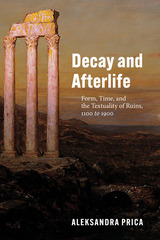
Decay and Afterlife
Form, Time, and the Textuality of Ruins, 1100 to 1900
Aleksandra Prica
University of Chicago Press, 2022
Covering 800 years of intellectual and literary history, Prica considers the textual forms of ruins.
Western ruins have long been understood as objects riddled with temporal contradictions, whether they appear in baroque poetry and drama, Romanticism’s nostalgic view of history, eighteenth-century paintings of classical subjects, or even recent photographic histories of the ruins of postindustrial Detroit. Decay and Afterlife pivots away from our immediate, visual fascination with ruins, focusing instead on the textuality of ruins in works about disintegration and survival. Combining an impressive array of literary, philosophical, and historiographical works both canonical and neglected, and encompassing Latin, Italian, French, German, and English sources, Aleksandra Prica addresses ruins as textual forms, examining them in their extraordinary geographical and temporal breadth, highlighting their variability and reflexivity, and uncovering new lines of aesthetic and intellectual affinity. Through close readings, she traverses eight hundred years of intellectual and literary history, from Seneca and Petrarch to Hegel, Goethe, and Georg Simmel. She tracks European discourses on ruins as they metamorphose over time, identifying surprising resemblances and resonances, ignored contrasts and tensions, as well as the shared apprehensions and ideas that come to light in the excavation of these discourses.
Western ruins have long been understood as objects riddled with temporal contradictions, whether they appear in baroque poetry and drama, Romanticism’s nostalgic view of history, eighteenth-century paintings of classical subjects, or even recent photographic histories of the ruins of postindustrial Detroit. Decay and Afterlife pivots away from our immediate, visual fascination with ruins, focusing instead on the textuality of ruins in works about disintegration and survival. Combining an impressive array of literary, philosophical, and historiographical works both canonical and neglected, and encompassing Latin, Italian, French, German, and English sources, Aleksandra Prica addresses ruins as textual forms, examining them in their extraordinary geographical and temporal breadth, highlighting their variability and reflexivity, and uncovering new lines of aesthetic and intellectual affinity. Through close readings, she traverses eight hundred years of intellectual and literary history, from Seneca and Petrarch to Hegel, Goethe, and Georg Simmel. She tracks European discourses on ruins as they metamorphose over time, identifying surprising resemblances and resonances, ignored contrasts and tensions, as well as the shared apprehensions and ideas that come to light in the excavation of these discourses.
[more]
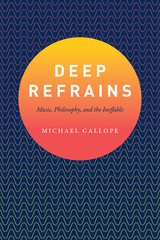
Deep Refrains
Music, Philosophy, and the Ineffable
Michael Gallope
University of Chicago Press, 2017
We often say that music is ineffable, that it does not refer to anything outside of itself. But if music, in all its sensuous flux, does not mean anything in particular, might it still have a special kind of philosophical significance?
In Deep Refrains, Michael Gallope draws together the writings of Arthur Schopenhauer, Friedrich Nietzsche, Ernst Bloch, Theodor Adorno, Vladimir Jankélévitch, Gilles Deleuze, and Félix Guattari in order to revisit the age-old question of music’s ineffability from a modern perspective. For these nineteenth- and twentieth-century European philosophers, music’s ineffability is a complex phenomenon that engenders an intellectually productive sense of perplexity. Through careful examination of their historical contexts and philosophical orientations, close attention to their use of language, and new interpretations of musical compositions that proved influential for their work, Deep Refrains forges the first panoptic view of their writings on music. Gallope concludes that music’s ineffability is neither a conservative phenomenon nor a pious call to silence. Instead, these philosophers ask us to think through the ways in which music’s stunning force might address, in an ethical fashion, intricate philosophical questions specific to the modern world.
In Deep Refrains, Michael Gallope draws together the writings of Arthur Schopenhauer, Friedrich Nietzsche, Ernst Bloch, Theodor Adorno, Vladimir Jankélévitch, Gilles Deleuze, and Félix Guattari in order to revisit the age-old question of music’s ineffability from a modern perspective. For these nineteenth- and twentieth-century European philosophers, music’s ineffability is a complex phenomenon that engenders an intellectually productive sense of perplexity. Through careful examination of their historical contexts and philosophical orientations, close attention to their use of language, and new interpretations of musical compositions that proved influential for their work, Deep Refrains forges the first panoptic view of their writings on music. Gallope concludes that music’s ineffability is neither a conservative phenomenon nor a pious call to silence. Instead, these philosophers ask us to think through the ways in which music’s stunning force might address, in an ethical fashion, intricate philosophical questions specific to the modern world.
[more]
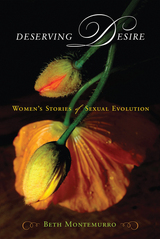
Deserving Desire
Women's Stories of Sexual Evolution
Montemurro, Beth
Rutgers University Press, 2015
Women experience considerable changes in their bodies, lives, and identity between the ages of twenty and seventy, including marriage, motherhood, the dissolution of relationships, and menopause, all of which often impact sexuality. In Deserving Desire, Beth Montemurro takes a wide-ranging look at the evolution of women’s sexuality over time, with a specific focus on the development of sexual subjectivity—that is sexual confidence, agency, and a sense of entitlement to sexual desire.
Detailed stories of the ninety-five women in this study explore how they become more comfortable with their bodies, when most begin to enjoy sex, feel confident and positive about engaging in it, and how they become sexual subjects in control of their bodies. Deserving Desire explores the complex multi-stage process in which sexual subjectivity evolves over a woman’s lifetime. As girls, they learn about sex and how those around them—parents, peers, religion and media—regard sex. Physical and emotional transitions such as having a baby or ending a relationship further affect women’s sexual confidence and desire. Montemurro emphasizes that sexual subjectivity is about feeling in control of sexual decision making and acting purposefully and confidently.
Though adolescent sexuality has been a major focus of sociological research, few studies have examined, as Montemurro does here, the development of sexuality through women’s lives and the events that change the way women feel about themselves, their bodies, and their relationships.
[more]
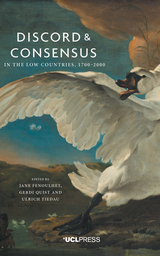
Discord and Consensus in the Low Countries, 1700-2000
Edited by Jane Fenoulhet, Gerdi Quist, and Ulrich Tiedau
University College London, 2016
All countries, regions and institutions are ultimately built on a degree of consensus, on a collective commitment to a concept, belief or value system. This consensus is continuously rephrased and reinvented through a narrative of cohesion and challenged by expressions of discontent and discord. The history of the Low Countries is characterised by both a striving for consensus and eruptions of discord, both internally and from external challenges. This interdisciplinary volume explores consensus and discord in a Low Countries context along broad cultural, linguistic and historical lines. Disciplines represented include early-modern and contemporary history; art history; film; literature; and translation scholars from both the Low Countries and beyond.
[more]

Divine Yet Human Epics
Reflections of Poetic Rulers from Ancient Greece and India
Shubha Pathak
Harvard University Press, 2014
The central character of Divine Yet Human Epics is the developing conception of epic itself. Its story unfolds as the ancient Greek idea of epic originates with Pindar and Herodotus on the basis of the Iliad and Odyssey. While this notion eventually leads their Sanskrit counterparts, the Ramaya?a and Mahabharata, to be understood selectively in modern times, medieval readers Anandavardhana and Rajasekhara reveal distinctive features of these ancient Indian poems earlier in this exegetical tale. Shubha Pathak's interpretative account concludes with a new way to connect these primary epics to their Greek analogues. Both epic pairs feature poetic kings who together affirm and interrogate their societies' central religious ideals: Greek kléos (or heroic glory, which assuages uncertainty about the afterlife) and Indian dharma (or righteousness, which counters encroaching immorality). The Greek and Sanskrit epics, by showing both the divine ease and the human difficulty with which kléos and dharma are achieved, employ similar teaching strategies to address the shared psychological needs of human beings learning to live within the disparate cultures of ancient Greece and India. This cross-cultural comparative study thus provides a more comprehensive perspective on the poems' religiosity than the vantage points of Hellenists or of Indologists alone.
[more]
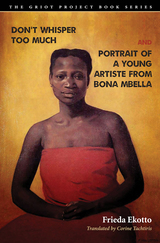
Don't Whisper Too Much and Portrait of a Young Artiste from Bona Mbella
Ekotto, Frieda
Bucknell University Press, 2019
Don’t Whisper Too Much was the first work of fiction by an African writer to present love stories between African women in a positive light. Bona Mbella is the second. In presenting the emotional and romantic lives of gay, African women, Ekotto comments upon larger issues that affect these women, including Africa as a post-colonial space, the circulation of knowledge, and the question of who writes history. In recounting the beauty and complexity of relationships between women who love women, Ekotto inscribes these stories within African history, both past and present. Don’t Whisper Too Much follows young village girl Ada’s quest to write her story on her own terms, outside of heteronormative history. Bona Mbella focuses upon the life of a young woman from a poor neighborhood in an African megalopolis. And “Panè,” a love story, brings the many themes from Don’t Whisper Much and Bona Mbella together as it explores how emotional and sexual connections between women have the power to transform, even in the face of great humiliation and suffering. Each story in the collection addresses how female sexuality is often marked by violence, and yet is also a place for emotional connection, pleasure and agency.
Published by Bucknell University Press. Distributed worldwide by Rutgers University Press.
Published by Bucknell University Press. Distributed worldwide by Rutgers University Press.
[more]
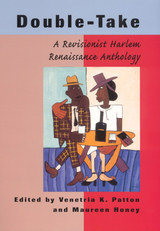
Double-Take
A Revisionist Harlem Renaissance Anthology
Patton, Venetria K
Rutgers University Press, 2001
In this important new anthology, Venetria K. Patton and Maureen Honey bring together a comprehensive selection of texts from the Harlem Renaissance-a key period in the literary and cultural history of the United States. The collection revolutionizes our way of viewing this era, since it redresses the ongoing emphasis on the male writers of this time. Double-Take offers a unique, balanced collection of writers-men and women, gay and straight, familiar and obscure. Arranged by author, rather than by genre, this anthology includes works from major Harlem Renaissance figures as well as often-overlooked essayists, poets, dramatists, and artists.
The editors have included works from a wide variety of genres-poetry, short stories, drama, and essays-allowing readers to understand the true interdisciplinary quality of this cultural movement. Biographical sketches of the authors are provided and most of the pieces are included in their entirety. Double-Take also includes artwork and illustrations, many of which are from original journals and have never before been reprinted. Significantly, Double-Take is the first Harlem Renaissance title to include song lyrics to illustrate the interrelation of various art forms.
The editors have included works from a wide variety of genres-poetry, short stories, drama, and essays-allowing readers to understand the true interdisciplinary quality of this cultural movement. Biographical sketches of the authors are provided and most of the pieces are included in their entirety. Double-Take also includes artwork and illustrations, many of which are from original journals and have never before been reprinted. Significantly, Double-Take is the first Harlem Renaissance title to include song lyrics to illustrate the interrelation of various art forms.
[more]
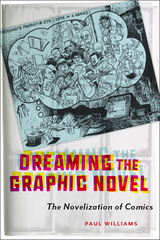
Dreaming the Graphic Novel
The Novelization of Comics
Paul Williams
Rutgers University Press, 2020
Winner of the Best Book Award in Comics History from the Grand Comics Database
Honorable Mention, 2019-2020 Research Society for American Periodicals Book Prize
The term “graphic novel” was first coined in 1964, but it wouldn’t be broadly used until the 1980s, when graphic novels such as Watchmen and Maus achieved commercial success and critical acclaim. What happened in the intervening years, after the graphic novel was conceptualized yet before it was widely recognized?
Dreaming the Graphic Novel examines how notions of the graphic novel began to coalesce in the 1970s, a time of great change for American comics, with declining sales of mainstream periodicals, the arrival of specialty comics stores, and (at least initially) a thriving underground comix scene. Surveying the eclectic array of long comics narratives that emerged from this fertile period, Paul Williams investigates many texts that have fallen out of graphic novel history. As he demonstrates, the question of what makes a text a ‘graphic novel’ was the subject of fierce debate among fans, creators, and publishers, inspiring arguments about the literariness of comics that are still taking place among scholars today.
Unearthing a treasure trove of fanzines, adverts, and unpublished letters, Dreaming the Graphic Novel gives readers an exciting inside look at a pivotal moment in the art form’s development.
Honorable Mention, 2019-2020 Research Society for American Periodicals Book Prize
The term “graphic novel” was first coined in 1964, but it wouldn’t be broadly used until the 1980s, when graphic novels such as Watchmen and Maus achieved commercial success and critical acclaim. What happened in the intervening years, after the graphic novel was conceptualized yet before it was widely recognized?
Dreaming the Graphic Novel examines how notions of the graphic novel began to coalesce in the 1970s, a time of great change for American comics, with declining sales of mainstream periodicals, the arrival of specialty comics stores, and (at least initially) a thriving underground comix scene. Surveying the eclectic array of long comics narratives that emerged from this fertile period, Paul Williams investigates many texts that have fallen out of graphic novel history. As he demonstrates, the question of what makes a text a ‘graphic novel’ was the subject of fierce debate among fans, creators, and publishers, inspiring arguments about the literariness of comics that are still taking place among scholars today.
Unearthing a treasure trove of fanzines, adverts, and unpublished letters, Dreaming the Graphic Novel gives readers an exciting inside look at a pivotal moment in the art form’s development.
[more]
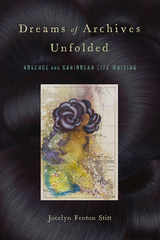
Dreams of Archives Unfolded
Absence and Caribbean Life Writing
Jocelyn Fenton Stitt
Rutgers University Press, 2021
The first book on pan-Caribbean life writing, Dreams of Archives Unfolded reveals the innovative formal practices used to write about historical absences within contemporary personal narratives. Although the premier genres of writing postcoloniality in the Caribbean have been understood to be fiction and poetry, established figures such as Erna Brodber, Maryse Condé, Lorna Goodison, Edwidge Danticat, Saidiya Hartmann, Ruth Behar, and Dionne Brand and emerging writers such as Yvonne Shorter Brown, and Gaiutra Bahadur use life writing to question the relationship between the past and the present. Stitt theorizes that the remarkable flowering of life writing by Caribbean women since 2000 is not an imitation of the “memoir boom” in North America and Europe; instead, it marks a different use of the genre born out of encountering gendered absences in archives and ancestral memory that cannot be filled with more research. Dreams of Archives makes a significant contribution to studies of Caribbean literature by demonstrating that women’s autobiographical narratives published in the past twenty years are feminist epistemological projects that rework Caribbean studies’ longstanding commitment to creating counter-archives.
[more]
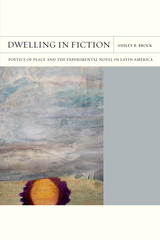
Dwelling in Fiction
Poetics of Place and the Experimental Novel in Latin America
Ashley R. Brock
Northwestern University Press, 2023
Explores the affective, ethical, and political demands that difficult reading places on readers of midcentury Latin American literature
The radical formal experiments undertaken by writers across Latin America in the mid-twentieth century introduced friction, opacity, and self-reflexivity to the very act of reading. Dwelling in Fiction: Poetics of Place and the Experimental Novel in Latin America explores the limitations and the possibilities of literature for conveying place-specific forms of life. Focusing on authors such as José María Arguedas, João Guimarães Rosa, and Juan José Saer, who are often celebrated for universalizing regional themes, Ashley R. Brock brings a new critical lens to Latin American writers who were ambivalent toward their era’s “boom.”
Beyond mere resistance to or critique of the commodification and political instrumentalization of rural topics and types, this countertrend of critical regionalism positions readers themselves as outsiders, pushing them to engage their senses, to train their attention, and to learn to dwell in unknown textual landscapes. Dwelling in Fiction draws on a transnational community of thinkers and writers to show how their midcentury aesthetic practices of sensorial pedagogy anticipate contemporary turns toward affect, embodiment, decoloniality, and ecological thought.
The radical formal experiments undertaken by writers across Latin America in the mid-twentieth century introduced friction, opacity, and self-reflexivity to the very act of reading. Dwelling in Fiction: Poetics of Place and the Experimental Novel in Latin America explores the limitations and the possibilities of literature for conveying place-specific forms of life. Focusing on authors such as José María Arguedas, João Guimarães Rosa, and Juan José Saer, who are often celebrated for universalizing regional themes, Ashley R. Brock brings a new critical lens to Latin American writers who were ambivalent toward their era’s “boom.”
Beyond mere resistance to or critique of the commodification and political instrumentalization of rural topics and types, this countertrend of critical regionalism positions readers themselves as outsiders, pushing them to engage their senses, to train their attention, and to learn to dwell in unknown textual landscapes. Dwelling in Fiction draws on a transnational community of thinkers and writers to show how their midcentury aesthetic practices of sensorial pedagogy anticipate contemporary turns toward affect, embodiment, decoloniality, and ecological thought.
[more]
READERS
Browse our collection.
PUBLISHERS
See BiblioVault's publisher services.
STUDENT SERVICES
Files for college accessibility offices.
UChicago Accessibility Resources
home | accessibility | search | about | contact us
BiblioVault ® 2001 - 2024
The University of Chicago Press









